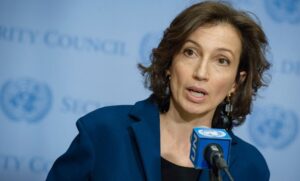The United Nations Educational Scientific and Cultural Organisation (UNESCO) has launched a practical guide for civil society intervention as ‘amicus curiae’ or “third party interveners” in freedom of expression cases before national or international courts.
UNESCO noted that legal proceedings related to freedom of expression cases can oftentimes present a unique opportunity for specialized organizations to advance international human rights standards related to the interpretation and enforcement of this fundamental human right. It added that on that basis, national and international courts have witnessed an increase in the number of amicus curiae interventions, that is, the intervention of a person or organization who participates in a legal proceeding to provide an external perspective on the case at hand, submitted by individuals or civil society organizations with the goal of bringing relevant information or legal trends that have not been highlighted by the parties to the attention of these courts.
Amicus curiae interventions can play a key role in setting lasting legal precedents for the protection and promotion of free, independent and pluralistic media ecosystems. They can also draw the attention of the wider public to a case where the right to freedom of expression or the safety of journalists is at stake, and serve as an important advocacy and educational tool for judges, lawyers, and society at large.
However, there are a number of considerations that any organization wishing to take part in a relevant case via amicus curiae interventions should take into account before embarking inti the amicus curiae process. Poorly led interventions can negatively affect the outcome of ongoing legal proceedings, cause unnecessary delays in the litigation, or politicize further an already politically sensitive case.
The UNESCO Guide for Amicus Curiae Interventions in Freedom of Expression Cases is set in six parts and seeks to equip civil society organizations with the basic tools to file effective amicus curiae interventions, and encourage them to intervene in cases where freedom of expression standards can be advanced or where the right to freedom of expression or the safety of journalists is at stake. The Guide provides practical information on how to file amicus curiae briefs while also setting out strategic considerations – as well as do’s and don’ts – with the goal of helping organizations write the most impactful brief possible.
Authored by Peter Noorlander, an independent consultant in human rights and media law & policy, founding Legal Director and former CEO of Media Defence, and Senior Legal Officer at ARTICLE 19, the 18-page guide contains discussion of the main strategic considerations that organisations thinking of intervening in such cases should take into account. This includes questions such as how an intervention fits into a broader campaign, the type of cases to intervene in, and whether to intervene alone or as part of a coalition.
It has a section providing case studies, each chosen to illustrate interventions before different types of court and in different scenarios; a section discussing practicalities, including how to monitor cases, engage lawyers and communicate with parties in the case.
Other parts of the guide include a section discussing technical legal requirements, before international human rights courts as well as at the national level; some recommended ‘do’s and don’ts’ in writing amicus curiae briefs, discussing what tone to strike and how to remain objective yet firmly set out the organisation’s perspective; and how to follow-up on a judgment, including monitoring implementation and engaging in post-judgment advocacy.
The full guide is available and can be downloaded at https://mediarightsagenda.org/docs/UNESCO_Practical_Guide_for_Amicus_Curiae_Interventions_in_FOE_Cases.pdf.
The publication of the guide was made with the support of Media Defence, an international human rights organization which provides legal help to journalists and independent media across the world who are under threat for their reporting.
The MDP serves to further strengthen UNESCO work at a global, regional, and national levels, by channeling funds towards emerging priorities and the most pressing needs to achieve its mandate on freedom of expression. It enables UNESCO Communication and Information Sector to address complex issues through the design and implementation of holistic medium and long-term interventions at national, regional and global levels. The clear advantage of this mechanism is that it allows UNESCO and its partners to achieve greater impact and sustainability, whilst reducing fragmentation of activities in the same field.







